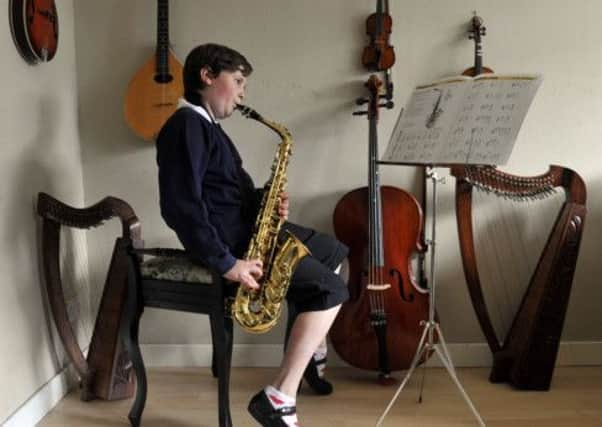Let the Children Play music lesson campaign success


Her comments were accompanied by exclusive Scotland on Sunday figures showing that a shocking 24 local authorities across Scotland were charging children between £95 and £340 per year to learn a musical instrument.
No fewer than 11 councils had increased fees for the new school year, while five local authorities were also charging children to sit Scottish Qualifications Authority (SQA) music exams – meaning they still had to pay up to £340 a year for lessons despite the fact that playing an instrument counted for 60 per cent of their SQA exam. A sixth was intending to introduce SQA fees the following year.
Advertisement
Hide AdLearning an instrument in school had become a postcode lottery in Scotland, available only to those whose parents could afford the fees. Despite being an integral part of music education that not only counts for 60 per cent of SQA music exams but provides huge educational, cultural and social benefits for the child, councils were increasingly viewing instrumental music as “low hanging fruit” that could be quietly cut away.
Meanwhile, fees were raised to the extent that they became out of reach to thousands of hardworking families. Let the Children Play wanted to change that.
We engaged the backing of musicians as diverse as Dame Evelyn Glennie, Frightened Rabbit, Simple Minds, Nicola Benedetti, Aidan Moffat and Sharleen Spiteri.
We spoke to Scotland’s Children’s Commissioner Tam Baillie, who questioned whether the current charging policies contravened the United Nation’s Convention on the Rights of a Child. We received widespread cross-party political support, and prompted a debate in the Scottish Parliament about instrumental music fees. The Scottish government and the Convention of Scottish Local Authorities (Cosla) ordered investigations into local authorities’ charging policies and in December, the government set up a parliamentary working group to, in the words of education secretary Mike Russell, “get a grip” on instrumental music tuition in Scotland.
We published figures showing the correlation between deprivation and lack of access to instrumental music lessons, as well as research showing that children who learn a musical instrument receive better grades in maths and English. We also published a five-point roadmap towards free tuition for all children. It read:
1) As a first step, an end to tuition charges for students sitting SQA music exams.
Advertisement
Hide Ad2) A national government policy for instrumental music tuition, to fill the current gap.
3) The education minister to take on direct responsibility and accountability for instrumental music tuition.
Advertisement
Hide Ad4) A commitment to reduce instrument hire costs and the establishment of an instrument fund.
5) A government commitment to end all tuition fees for instrumental music lessons.
Nine months on from our launch, following a sustained and high-profile campaign, the landscape for instrumental music tuition in Scotland is changing.
Two local authorities – Dumfries and Galloway and Dundee City – have dropped all instrumental music charges, making instrumental music lessons free in all their schools.
Another two – Midlothian and Dumfries & Galloway, scrapped their SQA charges earlier this year. A third, Aberdeenshire, which had planned on introducing the fees from August this year, abandoned the idea.
Today, Scotland on Sunday can reveal that the Scottish Government has now brought an end to all SQA charging, and the local authorities still imposing fees – Highland, Aberdeen City and Renfrewshire – will drop them from August.
Advertisement
Hide AdA £1 million instrument fund has been set up, which will be run by the Royal Conservatoire of Scotland and will provide new instruments to schools throughout the country. Alasdair Allan, minister for learning, has taken on responsibility for instrumental music tuition at government level. In stark comparison to last year, when 11 councils raised their fees, this year, not one has.
This week, the government will announce 17 recommendations on improving instrumental music tuition services in the country as part of a report by the Scottish Government’s instrumental music working group, which was set up in response to our campaign, that will come close to establishing a national policy on instrumental music tuition. With representatives from every area of music education in the country, as well as Cosla and the Scottish Government, it is likely to produce recommendations that will make learning an instrument more accessible to children than it has been in a generation.
Advertisement
Hide AdThere is still more to be done. While ten local authorities in Scotland now provide free instrumental music lessons in schools, 22 still charge up to £340. While no local authorities will impose fees for SQA music exams, in order to reach the standard required to sit those exams, free lessons are needed from the start.
While a £1m instrument fund has been created that will help re-stock Scotland’s schools with a wider variety of instruments that are fit for purpose, a number of councils still charge up to £83 per year for instrument hire.
When Benedetti helped launch Let the Children Play last September she said: “Learning an instrument is just as important as learning maths or English. It goes to the heart of who we are as human beings. How can it possibly be separated by something as superficial as whether you can pay for your lesson or not?”